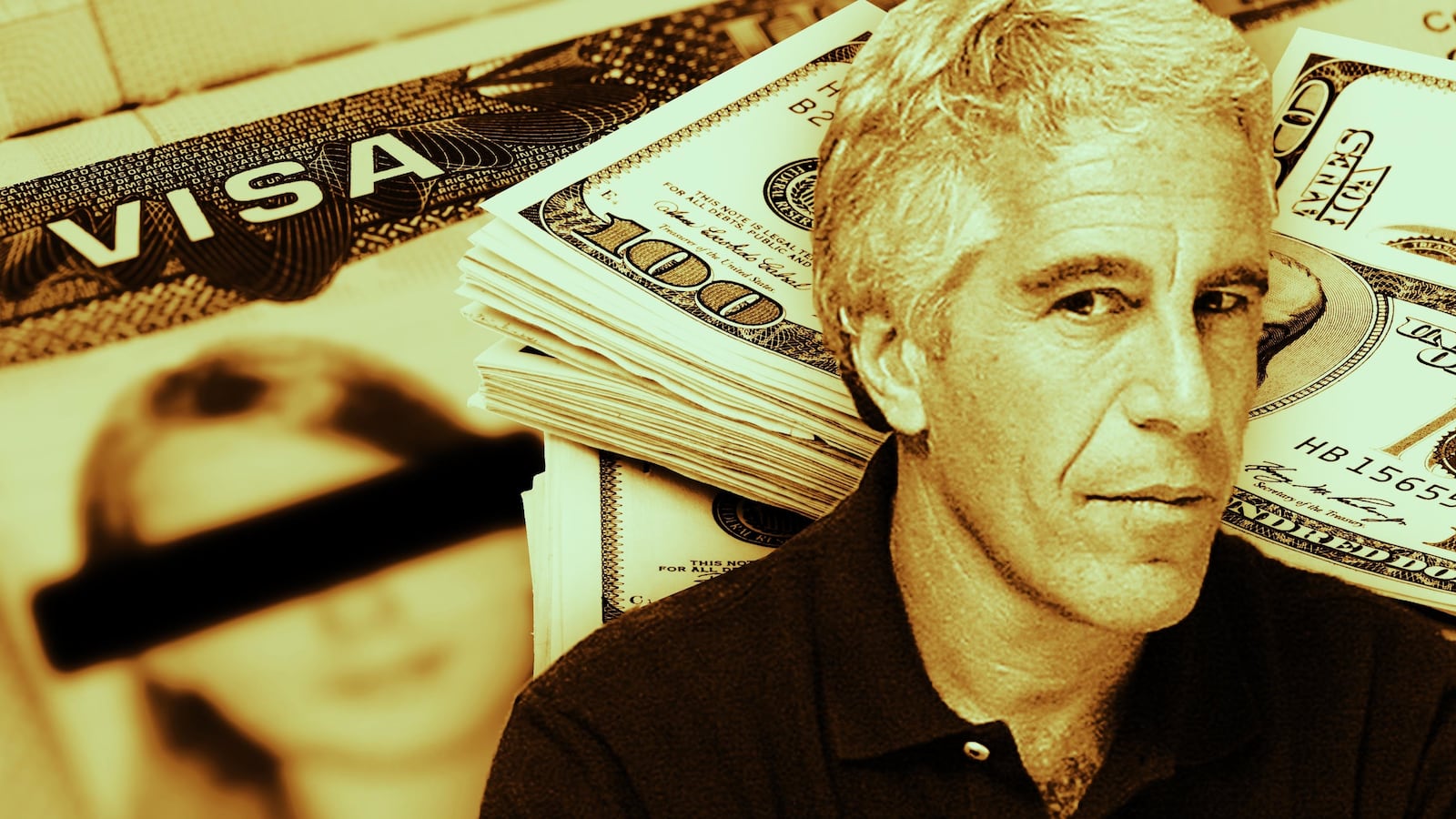Jeffrey Epstein’s $634-million estate is footing legal bills for an immigration attorney who represented the late sex-trafficker’s foreign-born victims.
In probate court, the attorney general of the U.S. Virgin Islands highlighted payouts for this mysterious immigration lawyer—and other questionable spending—as the estate fights the government’s freezing of its bank accounts so Epstein’s minions can pay $500,000 in monthly bills, and millions in outstanding legal fees.
When Attorney General Denise N. George filed a civil racketeering suit against Epstein’s estate in January, she placed criminal activity liens on Virgin Islands assets and property allegedly used in Epstein’s trafficking ring. She agreed to release funds after reviewing and approving the estate’s operating expenses, but the estate is challenging these holds, saying they make it impossible to meet financial obligations. In a June pleading, the AG said the liens ensure assets are preserved for victims’ and the government’s claims “without any further attempt to evade accountability.”
In recent months, the AG accused the estate of withholding information on its spending. “When the Government asked the Estate to confirm that it was not paying legal expenses for other individuals, the Estate responded that it was only paying the legal expenses of two former employees,” said Linda Singer, a lawyer for the government, in an August letter to Magistrate Carolyn Hermon-Percell. (Those employees weren’t identified in the court filing.)
But Epstein’s lawyers were lying, the government charged. “In fact, the Estate’s last quarterly accounting confirms it is currently paying the fees of a law firm representing an immigration attorney the Government has reason to believe was retained to seek immigration status for victims of Epstein’s and others’ sexual abuse,” Singer continued. The estate’s co-executor Darren Indyke “signed the checks to pay this attorney.”
Epstein was known to lure young women and girls from Eastern Europe, preying on their dreams of modeling and higher education, and housing them in a Manhattan apartment building. The sex-offender also allegedly forced victims to marry his female recruiters so they’d land citizenship via the fake same-sex unions.
Indeed, when New York financial regulators fined Deutsche Bank for failing to detect millions of dollars of suspicious transactions in Epstein’s accounts, they pointed out payments to Russian models, as well as multiple women with Eastern European surnames “for the stated purpose of covering hotel expenses, tuition, and rent.”
While the name of the immigration lawyer is not revealed, the government claims he or she facilitated Epstein’s sick sex-trafficking scheme. “Payments to defend this lawyer are not appropriate expenditures of Estate funds, and these payments suggest that Estate funds are being used even now to conceal and protect participants in Epstein’s criminal enterprise,” Singer wrote in her letter to the judge.
The immigration lawyer was mentioned again in September in a letter from Deputy Attorney General Carol Thomas-Jacobs, who said the estate’s most recent accounting shows it’s paying legal fees “for an immigration attorney alleged to have sought immigration status for Epstein’s trafficking victims.”
Representatives for Epstein’s estate and the attorney general’s office did not return messages left by The Daily Beast.
It’s unclear whether the unnamed immigration attorney helped with the sham marriages Epstein allegedly orchestrated so women in his entourage could obtain citizenship. Katlyn Doe, an anonymous victim of Epstein, claims the financier coerced her into marrying one of his female recruiters in 2013 so the woman could stay in America.
In a lawsuit, Doe alleges Epstein promised to pay her $20,000 for a serious medical surgery in exchange for the phony nuptials. The complaint says Epstein’s “long-time New York attorney” arranged the paperwork, and the women even had a photoshoot “to give the appearance that the marriage was legitimate.” The couple divorced in 2017, but Doe says Epstein ultimately paid only half of what he owed her.
Last year, Business Insider reported Epstein arranged two other same-sex marriages for women in his orbit. The Daily Mail revealed one of them, reporting that Epstein’s 30-year-old “girlfriend” Karyna Shuliak—the last person to speak to Epstein before his jailhouse suicide—married another associate, Jennifer Kalin, in 2013. The couple divorced after Epstein’s July 2019 arrest.
Aside from the immigration lawyer’s legal tab, Singer said the estate’s $500,000 a month in operating costs—excluding the administration of the victim compensation fund, federal taxes, property taxes and legal fees—“raises questions about the Estate’s spending, particularly given the Estate’s recalcitrance in providing details or support.”
OK! magazine first reported on the estate’s expenses, providing a breakdown that lists $180,000 each month for staff and utilities at Epstein’s properties in the U.S. and France and $83,560 for maintenance and parking for aircraft. (The gossip rag also revealed a Minnesota man is claiming to be Epstein’s love child in a letter filed with the court.)
Because of the government’s liens on the estate, co-executors Indyke and Richard Kahn allegedly only had access to $239,698 last month.
Indyke, Epstein’s personal attorney since the 1990s, handled the financier’s charities and legal disputes, and represented companies of women in Epstein’s network, including Russian former model Lana Pozhidaeva’s project for female entrepreneurs in 2018.
His handling of Epstein’s cash was also mentioned in the Deutsche Bank case. Regulators discovered Indyke withdrew $800,000 in cash—often in maximum withdrawals of $7,500—from Epstein’s accounts from 2013 to 2017. When bank staff asked about these withdrawals, Indyke “replied Epstein used it for travel, tipping and expenses,” a consent order revealed. (This order refers to Indyke as “Attorney-1,” but his alias was confirmed in recent pleadings by the Virgin Islands AG.)
Despite Epstein’s riches, estate lawyer Christopher Kroblin said it “has been unable to pay its legal bills since May 2020” and owes law firms over $4 million, including for defending against the Attorney General’s pending lawsuit and 27 suits brought by accusers. (Kroblin’s law partner, Virgin Islands tax attorney Erika Kellerhals, was an officer of Epstein’s dubious charities: Gratitude America Ltd. and the J. Epstein Virgin Islands Foundation.)
“In the event that the Attorney General’s intransigence continues, the Estate’s Co-Executors will no longer be able to continue to administer the Estate,” Kroblin wrote the judge on Sept. 9. “The residential properties will quickly deteriorate, the aircraft and other assets will fall into disrepair, its assets will remain unsold, and legal proceedings will be defaulted.”
Emails from May of this year indicate estate lawyer Andrew Tomback asked the AG to release the government’s liens so the estate could transfer $7.5 million from Epstein’s Southern Trust account into the estate’s coffers. He also requested the release of another $7.5 million from the estate account.
“The Co-Executors of the Epstein Estate now have approximately $2.9M in existing unpaid legal expenses, with those fees (including to defend the multiple litigations in the U.S.) running at nearly $1M per month,” Tomback wrote to Singer. “The Estate also continues to incur approximately $750K per month in administrative expenses, including a now-overdue $900K estate tax payment owed to New York State earlier this month.”
Singer replied that the government released $7.5 million from criminal activity liens since February and said the estate hasn’t given an explanation for several items including “$750,000 in monthly expenses, which differs from the Estate’s filed accounting; payments of $239,000 to the J. Epstein Foundation; any outstanding loans, payroll expenses that only appeared in December, and $15.5 million in payments, for which the Estate’s explanations do not seem to match financial records.”
Meanwhile, Special Master Rosalie Simmonds Ballentine, appointed by the court this summer to make sure the massive estate’s accounting is accurate, questioned the estate’s “wholesale” redactions in vouchers supporting its accounting. In a Sept. 28 report, Ballentine said it’s “impossible to determine if they indeed supported the purposes or expenses set forth in the schedules.”
Epstein’s fortune has always been shrouded in mystery; he’s rumored to have obtained his wealth through a Ponzi scheme, or blackmailing powerful friends who abused his victims, or even through his ex-girlfriend’s father, media tycoon Robert Maxwell. In a 2003 Vanity Fair profile, Epstein claimed to only represent billionaires; his single known client was former Victoria’s Secret mogul Les Wexner. But billionaire investor Leon Black is also linked to Epstein and gifted $10 million to his shadowy charity in 2015.
Details surrounding Epstein’s last will and testament are likewise murky. Two days before his suicide, Epstein transferred his holdings to a mysterious trust whose members may never be revealed. And he named Boris Nikolic, a former adviser to Bill Gates, as backup executor, a role the biotech entrepreneur quickly declined.
Months after Epstein died, his estate moved more than $12.9 million to Southern Country International, a specialized bank the financier opened in the Virgin Islands in 2014. The bank’s year-end value was $499,759 weeks later. “There’s no explanation for it,” said Hermon-Purcell, the magistrate judge, at a February hearing. According to the New York Times, the judge questioned why Southern Country received money from the estate, which claimed the transfer was made in error.
In a Sept. 8 letter to estate lawyer Kroblin, Special Master Ballentine also underscored seemingly suspicious movements of large sums of money, including “payroll expenses with no information on who the employees were, what they did on behalf of the estate or the number of persons paid; hotel receipts with no information on who stayed in the hotel and the purpose of the stay; [and] payment to the law firm of a co-executor, with no vendor identification.”
“In addition, there are payments to two of the decedent’s corporations, Zorro Management and NES, both of which are listed as having no value,” Ballentine added. “The reason for payments to these corporations is unclear.”
Kroblin called accusations the estate has been hiding information “unfounded, unfair, and misleading” and “squarely at odds with reality.” In a letter Sept. 15, Kroblin said the government already obtained “information about every transaction by the Estate down to the penny” after subpoenaing the estate’s bank.
He also took aim at AG George’s flurry of subpoenas to a variety of people and entities associated with Epstein, saying “current and former employees have determined that they need counsel” and many “have understandably requested indemnification for legal fees for legal representation, which they otherwise cannot afford.”
As part of her investigation into Epstein’s sex crimes in the Virgin Islands, George has issued civil subpoenas to people and companies including BNP Paribas, a Paris-based bank; former Epstein accountant Bella Klein; Epstein’s ex-assistant and alleged co-conspirator Lesley Groff; and Epstein’s former girlfriend Eva Andersson-Dubin and her husband, billionaire hedge-fund manager Glenn Dubin.
(Groff’s attorney, Michael Bachner, told The Daily Beast: “As an executive assistant to Epstein, Lesley worked as part of a professional staff that included in-house attorneys, accountants, an office manager and other office staff. Lesley’s job included making appointments for Mr. Epstein as directed by him, taking his messages, and setting up high-level meetings with CEOs, business executives, scientists, politicians and celebrities. At no time during Lesley’s employment with Epstein did she ever engage in any misconduct.”)
Kroblin asked the judge to intervene and remove liens from the estate, writing, “The Estate is on the verge of suffering irreparable harm.”
It’s unknown whether the estate has since obtained access to the funds.
The legal tussles between Epstein’s estate and the Virgin Islands government don’t appear to have impacted payouts from the victims compensation fund, which began taking claims in June and is run independently from the estate.
The Epstein Victims’ Compensation Program, which serves as an alternative to litigation for accusers, began making payments to women last month. If victims accept the program’s offers, they must agree to drop their litigation against the estate and any agents of Epstein, including his alleged accomplice Ghislaine Maxwell.
“More than 50 individuals have filed claims so far and more than 140 have received a claims packet,” a program spokesperson told The Daily Beast. “Compensation offers are currently being issued and paid.” The spokesperson said the fund is also accepting international claims and has been in contact with people abroad, including in the U.K.









